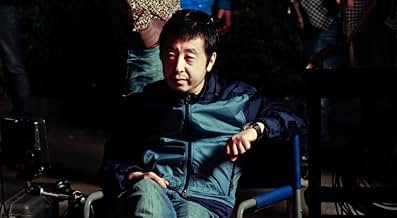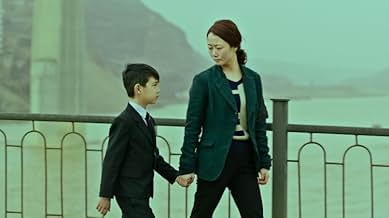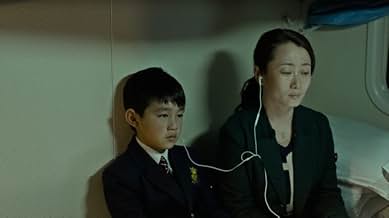AVALIAÇÃO DA IMDb
6,9/10
6,8 mil
SUA AVALIAÇÃO
Adicionar um enredo no seu idiomaThe life of Tao, and those close to her, is explored in three different time periods: 1999, 2014, and 2025.The life of Tao, and those close to her, is explored in three different time periods: 1999, 2014, and 2025.The life of Tao, and those close to her, is explored in three different time periods: 1999, 2014, and 2025.
- Direção
- Roteirista
- Artistas
- Prêmios
- 26 vitórias e 42 indicações no total
Yi Zhang
- Zhang Jinsheng
- (as Zhang Yi)
Zijian Dong
- Zhang Daole aka Dollar
- (as Dong Zijian)
Avaliações em destaque
Finally caught up Jia's latest film in the cinema during my sojourn in China, more than one month after its national theatrical release, quite a long-run if you are familiar with China's booming but money-seeking film market, an art house feature can barely survive even for one week if attendance fails to hold up. Also notably it is his first theatrical release in China after 24 CITY (2008).
MOUNTAINS MAY DEPART forms a ternary narrative within 3 different time-span with an ever- wider Aspect Ratio (1.37:1, 1.85:1 and 2.35:1). The first chapter is in 1999, in a Northern east industrial town, on the eve of the millennium, audience is invited to participate in a love-triangle among Tao (Zhao) and her two childhood friends Jinsheng (Zhang) and Liangzi (Liang), the stability of a harmonious triangle (Chinese are too materialistic and selfish to even have the gut to attempt the enticing romanticism epitomised half-an-century ago in JULES AND JIM, 1962) disintegrates when men's possession comes to the fore. Oscillating between a colliery upstart and a destitute coal-miner, Tao's eventual choice is perfectly legitimate if put oneself in her shoes, we might most likely make the same decision - a future capitalist is far superior than a working-class honest man. Then Jia's trademark metaphorical injection of a crashing seeder becomes the harbinger of a downcast future for Tao and at the end of first chapter, the title card belatedly appears on the screen, "山河故人", its literal translation should be "mountain, river and old friend".
The second chapter fast-forwards 15 years to the present, in 2014, Liangzi returns to hometown with his wife and their child, suffering from undisclosed disease due to long-term hard labor, he is desperate to borrow money for his medical treatment, and Tao is his last resort. Divorced from Jinsheng, who has remarried and moved to Shanghai with their son Daole (homophonous to dollar), the forty-year-old Tao is a successful business woman owns a petrol company. Ironically it is also money, which has destroyed their rapport in the first place, finally mends their broken friendship, but also tragically shoves them drift farther away, leaving both a wistful aftertaste. Only so much for Liangzi, who will be left out altogether in the following story. A family funeral reunites Tao and an eight-year-old Daole (Rong) for a couple of days, but the gaping physical distance is too detrimental to shape an intimate mother-son connection, before leaving, Tao leaves him a key to remind him there will always be a home for him.
The final chapter sets in the near future, in 2025, Daole (Dong), now a college student living in Australia with Jinsheng, experiences the Oedipus complex in the most impressionable age, aggravated by the strained relationship with his father (encapsulated by the language barrier), a lost sense of belonging, and the vague memory of his birth mother, he develops a may-December romance with his Chinese teacher Mia (Chang), a middle-aged divorcée. Home is calling, but Jia leaves an open ending, it ends with Tao dancing to Pet Shop Boys' GO WEST in the snow-land, completes a formative salute to the opening dancing sequence, the same song, 26 years apart.
MOUNTAINS MAY DEPART tellingly marks that Zhangke Jia has transitioned to a new phase of filmmaking, less pungent (but not less insightful) in his social commentary but more aware of a film's holistic overview, it is also the first time in his works he creates a future scenario, although the third part is the weakest link, it is a step of trying something out of his comfort zone, where he masterly applies Sally Yeh's TAKE CARE, a Cantonese song from 1990, as a recurring motif to extract an air of undissipated melancholia. His script always finds its root in reality and excellently proffers a generous platform for its cast to portray various characters, Tao Zhao, Jia's wife and muse, delineates a demanding role ranging across almost three decades beautifully and compassionately, and Yi Zhang is the scene-stealing object of ridicule as a shallow parvenu, the excrescence of China's unbalanced development.
In a nutshell, MOUNTAINS MAY DEPART can't be estimated as the crest among Jia's filmography, but in a promising way, it takes him out of the pigeonhole as an uncompromising social observer and critic, an art-house devotee whose film is solely aiming for western recognition, and signifies his potential to concoct something more eclectic and emotionally abiding.
MOUNTAINS MAY DEPART forms a ternary narrative within 3 different time-span with an ever- wider Aspect Ratio (1.37:1, 1.85:1 and 2.35:1). The first chapter is in 1999, in a Northern east industrial town, on the eve of the millennium, audience is invited to participate in a love-triangle among Tao (Zhao) and her two childhood friends Jinsheng (Zhang) and Liangzi (Liang), the stability of a harmonious triangle (Chinese are too materialistic and selfish to even have the gut to attempt the enticing romanticism epitomised half-an-century ago in JULES AND JIM, 1962) disintegrates when men's possession comes to the fore. Oscillating between a colliery upstart and a destitute coal-miner, Tao's eventual choice is perfectly legitimate if put oneself in her shoes, we might most likely make the same decision - a future capitalist is far superior than a working-class honest man. Then Jia's trademark metaphorical injection of a crashing seeder becomes the harbinger of a downcast future for Tao and at the end of first chapter, the title card belatedly appears on the screen, "山河故人", its literal translation should be "mountain, river and old friend".
The second chapter fast-forwards 15 years to the present, in 2014, Liangzi returns to hometown with his wife and their child, suffering from undisclosed disease due to long-term hard labor, he is desperate to borrow money for his medical treatment, and Tao is his last resort. Divorced from Jinsheng, who has remarried and moved to Shanghai with their son Daole (homophonous to dollar), the forty-year-old Tao is a successful business woman owns a petrol company. Ironically it is also money, which has destroyed their rapport in the first place, finally mends their broken friendship, but also tragically shoves them drift farther away, leaving both a wistful aftertaste. Only so much for Liangzi, who will be left out altogether in the following story. A family funeral reunites Tao and an eight-year-old Daole (Rong) for a couple of days, but the gaping physical distance is too detrimental to shape an intimate mother-son connection, before leaving, Tao leaves him a key to remind him there will always be a home for him.
The final chapter sets in the near future, in 2025, Daole (Dong), now a college student living in Australia with Jinsheng, experiences the Oedipus complex in the most impressionable age, aggravated by the strained relationship with his father (encapsulated by the language barrier), a lost sense of belonging, and the vague memory of his birth mother, he develops a may-December romance with his Chinese teacher Mia (Chang), a middle-aged divorcée. Home is calling, but Jia leaves an open ending, it ends with Tao dancing to Pet Shop Boys' GO WEST in the snow-land, completes a formative salute to the opening dancing sequence, the same song, 26 years apart.
MOUNTAINS MAY DEPART tellingly marks that Zhangke Jia has transitioned to a new phase of filmmaking, less pungent (but not less insightful) in his social commentary but more aware of a film's holistic overview, it is also the first time in his works he creates a future scenario, although the third part is the weakest link, it is a step of trying something out of his comfort zone, where he masterly applies Sally Yeh's TAKE CARE, a Cantonese song from 1990, as a recurring motif to extract an air of undissipated melancholia. His script always finds its root in reality and excellently proffers a generous platform for its cast to portray various characters, Tao Zhao, Jia's wife and muse, delineates a demanding role ranging across almost three decades beautifully and compassionately, and Yi Zhang is the scene-stealing object of ridicule as a shallow parvenu, the excrescence of China's unbalanced development.
In a nutshell, MOUNTAINS MAY DEPART can't be estimated as the crest among Jia's filmography, but in a promising way, it takes him out of the pigeonhole as an uncompromising social observer and critic, an art-house devotee whose film is solely aiming for western recognition, and signifies his potential to concoct something more eclectic and emotionally abiding.
Mountains May Depart, directed by Zhangke Jia, is a very fine Chinese drama, whose timeline spans some twenty-five years from the past, to the present, to the future, representing China in the modern age and possibly where it's headed. It is something that's quite unique and interesting. Jia was also the director of a movie I saw a few years ago called A Touch of Sin, and while I remember admiring that film (which is of a considerably darker subject matter than this one), it left me feeling a little cold, while I enjoyed the experience of Mountains May Depart more.
The main character in story, who is connected in one way or another to almost every other prominent person, is a woman named Tao Zhao, played by Shen Tao. She is the heart of the film even during much of the parts she's not in, playing it with empathy and truth in her journey, a very fine performance. There are two other good performances by Yi Zhang and Jing Dong Liang, and these three main character evolve significantly through time. But the main strength is a story dealing themes of class and materialism, and the cost of progress, put together in a way worthy of these universal human subjects.
Mountains does have some issues in the final of the three acts as it becomes a little odd--odd in a way that that might have worked with different material, but doesn't quite fit with the rest of this film. Still, this is an overall fascinating and moving experience, well-acted and written, making itself very relatable and is an impressive way to view these people over time.
The main character in story, who is connected in one way or another to almost every other prominent person, is a woman named Tao Zhao, played by Shen Tao. She is the heart of the film even during much of the parts she's not in, playing it with empathy and truth in her journey, a very fine performance. There are two other good performances by Yi Zhang and Jing Dong Liang, and these three main character evolve significantly through time. But the main strength is a story dealing themes of class and materialism, and the cost of progress, put together in a way worthy of these universal human subjects.
Mountains does have some issues in the final of the three acts as it becomes a little odd--odd in a way that that might have worked with different material, but doesn't quite fit with the rest of this film. Still, this is an overall fascinating and moving experience, well-acted and written, making itself very relatable and is an impressive way to view these people over time.
Read full review here: http://bit.ly/2eo9O3d
Somewhere in Mountains May Depart there's a quote I can't recall that says, effectively, you can't spend your entire life with any one other person. While this may not be categorically true, if you think through the eras of a life - as a baby, toddler, childhood, teenager, young adult, middle-age, and so on - it is unlikely that any one person will be a part of your daily interactions throughout. Considering that, it can be true that the impact someone has on your life may be greater than the portion of time you spend with them. Through a handful of characters whose lives intertwine over three distinct periods of time - 1999, 2014, & 2025 - Chinese-born director Jia Zhangke explores and rejoices in the emotional resonance of our relationships in Mountains May Depart.
The three epochs of the film are each brilliantly conceived aesthetically to provide a subtle atmospheric guide to the scenes they are home to within the story. The boxy, more realistic and grainy style of the 1999 sequence - designed to match actual documentary footage the director and his cinematographer shot from the same period - is a little more raw, like the youthful emotions the characters experience in their mid-20's. Here we have a love triangle where our central character, Tao, is confronted with a choice between the brash, rich, and charming Jinsheng and the humble coal-miner Liangzi. The 2014 section is a wider aspect ratio with a higher quality, yet natural visual reflecting Tao's middle-aged experience. Life's lessons have provided a bit more perspective and the muted colors are like some of her dreams that haven't worked out as planned. She's divorced and facing a continental estrangement from her 7-year old son. A fully widescreen format with an artificial, over-developed HD quality evokes a 2025 that is equally more advanced and more separated from the past. This is the backdrop as Tao's son Dollar has to learn why he feels unsettled in a life he's done little to create for himself. Here, in a bit of an Oedipal twist, he develops a relationship with a surrogate mother of sorts that reminds the youth, now so far removed from his past that he can't even speak his first language, where he came from. For the first time of his own volition he makes the choice to search and reach backwards so that he can progress and grow. It hurts. You don't know if he achieves what he's reaching for but the important thing is that he chooses to do it.
Zhangke uses artifacts from his own life, from pop-culture, and of a more universal nature to serve as totems for emotional relationships that bridge the difference timelines. In 1999 Tao is young and bright, greeting each moment with a smile. She rejoices in music and food that bring her joy. Later in 2014 she faces losing everyone that is or has been important to her and these things become tools for holding on to what she's lost. A divorce left her with lots of money and a lost custody battle for her young son, whose father is abandoning all remnants of their culture and taking him to Australia. After panicking, Tao resolves to make the most impact she can on the impressionable and hungry heart of her little boy. She prepares several tokens for him to keep close through taste, touch, sound and feeling, as they will become further away than ever. The keys she gives Dollar are based on the director's own mother doing the same for him. It's possible she may never know the impact they have in his life but they become figuratively the keys to his unlocking his own freedom (see what I did there??) as he comes of age in 2025. These tokens used throughout the film, and especially two key pieces of music and the light-touch score from Yoshihiro Hanno, immediately have the same effect on the viewer each time they are re-introduced to signify a key relationship and emotion whose origin may be otherwise untraceable to the characters.
Somewhere in Mountains May Depart there's a quote I can't recall that says, effectively, you can't spend your entire life with any one other person. While this may not be categorically true, if you think through the eras of a life - as a baby, toddler, childhood, teenager, young adult, middle-age, and so on - it is unlikely that any one person will be a part of your daily interactions throughout. Considering that, it can be true that the impact someone has on your life may be greater than the portion of time you spend with them. Through a handful of characters whose lives intertwine over three distinct periods of time - 1999, 2014, & 2025 - Chinese-born director Jia Zhangke explores and rejoices in the emotional resonance of our relationships in Mountains May Depart.
The three epochs of the film are each brilliantly conceived aesthetically to provide a subtle atmospheric guide to the scenes they are home to within the story. The boxy, more realistic and grainy style of the 1999 sequence - designed to match actual documentary footage the director and his cinematographer shot from the same period - is a little more raw, like the youthful emotions the characters experience in their mid-20's. Here we have a love triangle where our central character, Tao, is confronted with a choice between the brash, rich, and charming Jinsheng and the humble coal-miner Liangzi. The 2014 section is a wider aspect ratio with a higher quality, yet natural visual reflecting Tao's middle-aged experience. Life's lessons have provided a bit more perspective and the muted colors are like some of her dreams that haven't worked out as planned. She's divorced and facing a continental estrangement from her 7-year old son. A fully widescreen format with an artificial, over-developed HD quality evokes a 2025 that is equally more advanced and more separated from the past. This is the backdrop as Tao's son Dollar has to learn why he feels unsettled in a life he's done little to create for himself. Here, in a bit of an Oedipal twist, he develops a relationship with a surrogate mother of sorts that reminds the youth, now so far removed from his past that he can't even speak his first language, where he came from. For the first time of his own volition he makes the choice to search and reach backwards so that he can progress and grow. It hurts. You don't know if he achieves what he's reaching for but the important thing is that he chooses to do it.
Zhangke uses artifacts from his own life, from pop-culture, and of a more universal nature to serve as totems for emotional relationships that bridge the difference timelines. In 1999 Tao is young and bright, greeting each moment with a smile. She rejoices in music and food that bring her joy. Later in 2014 she faces losing everyone that is or has been important to her and these things become tools for holding on to what she's lost. A divorce left her with lots of money and a lost custody battle for her young son, whose father is abandoning all remnants of their culture and taking him to Australia. After panicking, Tao resolves to make the most impact she can on the impressionable and hungry heart of her little boy. She prepares several tokens for him to keep close through taste, touch, sound and feeling, as they will become further away than ever. The keys she gives Dollar are based on the director's own mother doing the same for him. It's possible she may never know the impact they have in his life but they become figuratively the keys to his unlocking his own freedom (see what I did there??) as he comes of age in 2025. These tokens used throughout the film, and especially two key pieces of music and the light-touch score from Yoshihiro Hanno, immediately have the same effect on the viewer each time they are re-introduced to signify a key relationship and emotion whose origin may be otherwise untraceable to the characters.
Reading the reviews, you might suspect this to be a sophisticated, political film. You couldn't be more wrong: there's nothing sophisticated about it, it's about a heart that breaks over time.
The story follows a woman, and two men from different social status (a mine worker and a director), who both love her. Eventually she has to decide for one of them, but as time goes by, she wonders whether she made the right choice or not. Told over a time span of 25 years, the film shows like few others how time changes our society, affects the private lives of individuals. Especially the last part set in 2025 is masterfully done, it could have turned out sophisticated, instead it hits right into the heart.
The film says that things like social status and language do change our daily lives, and those changes can never be undone again.
The usage of the movie format is genius (even more then in Xavier Dolan's 'Mommy'), it tells us, that even though the future broadens our perspective, it also makes us lose focus of what is truly essential to live a happy life.
I have watched a ton of great movies in my life. This one takes the cake for most heartbreaking ending of all time. There are no words to describe it.
The story follows a woman, and two men from different social status (a mine worker and a director), who both love her. Eventually she has to decide for one of them, but as time goes by, she wonders whether she made the right choice or not. Told over a time span of 25 years, the film shows like few others how time changes our society, affects the private lives of individuals. Especially the last part set in 2025 is masterfully done, it could have turned out sophisticated, instead it hits right into the heart.
The film says that things like social status and language do change our daily lives, and those changes can never be undone again.
The usage of the movie format is genius (even more then in Xavier Dolan's 'Mommy'), it tells us, that even though the future broadens our perspective, it also makes us lose focus of what is truly essential to live a happy life.
I have watched a ton of great movies in my life. This one takes the cake for most heartbreaking ending of all time. There are no words to describe it.
For the most part, this is a beautifully written movie. The direction and acting are excellent throughout. The writing is too. although the sequence set in Australia is rather unnecessary. I have read reviews saying they found this sequence awkward. it is mostly in English. I didn't find it awkward. It just didn't bring anything to the movie. We could have been spending more time with the wonderful Tao Zhao. As I said all the performances are excellent. But it's her's you will remember, and the film does end perfectly
Você sabia?
- CuriosidadesSome sequences (in the 1999 segment) were filmed by the director and the cinematographer back in 2001.
- Erros de gravaçãoThe young boy who plays Tao's son in 2014 is also part of the crowd of children that watches her perform at the new year's celebrations in 1999.
- Cenas durante ou pós-créditosThe title appears more than forty minutes after the beginning of the movie.
- Trilhas sonorasGo West
Written by Henri Belolo, Jacques Morali and Victor Willis, Neil Tennant and Chris Lowe
Performed by Pet Shop Boys
Principais escolhas
Faça login para avaliar e ver a lista de recomendações personalizadas
- How long is Mountains May Depart?Fornecido pela Alexa
Detalhes
- Data de lançamento
- Países de origem
- Central de atendimento oficial
- Idiomas
- Também conhecido como
- Mountains May Depart
- Locações de filme
- Fenyang, Shanxi, China(Tao's home town)
- Empresas de produção
- Consulte mais créditos da empresa na IMDbPro
Bilheteria
- Faturamento bruto nos EUA e Canadá
- US$ 82.913
- Fim de semana de estreia nos EUA e Canadá
- US$ 5.550
- 14 de fev. de 2016
- Faturamento bruto mundial
- US$ 5.215.660
- Tempo de duração
- 2 h 6 min(126 min)
- Cor
- Mixagem de som
Contribua para esta página
Sugerir uma alteração ou adicionar conteúdo ausente

























